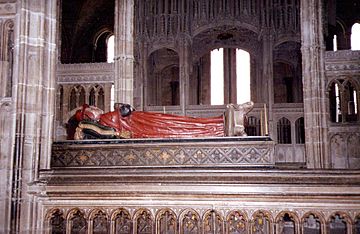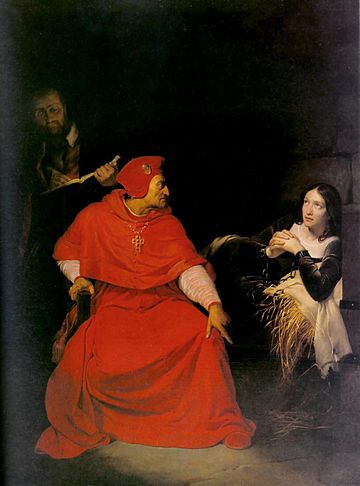Henry Beaufort facts for kids
Quick facts for kids Henry Beaufort |
|
|---|---|
| Cardinal, Bishop of Winchester | |
| Church | Roman Catholic Church |
| Province | Canterbury |
| Diocese | Winchester |
| Enthroned | 1404 |
| Reign ended | 1447 |
| Predecessor | William of Wykeham |
| Successor | William Waynflete |
| Other posts |
|
| Orders | |
| Consecration | 14 July 1398 |
| Created Cardinal | 24 May 1426 |
| Rank | Cardinal Priest |
| Personal details | |
| Born | c. 1375 Château de Beaufort, Anjou, Kingdom of France |
| Died | 11 April 1447 (aged 71–72) Wolvesey Castle, Winchester, Kingdom of England |
| Buried | Winchester Cathedral |
| Denomination | Roman Catholic Church |
| Parents | John of Gaunt and Katherine Swynford |
| Previous post |
|
| Coat of arms |  |

Henry Beaufort (born around 1375 – died 11 April 1447) was an important English church leader and politician. He was a Bishop of Lincoln and later Bishop of Winchester. He also became a Cardinal in the Catholic Church. Henry Beaufort served three times as the Lord Chancellor of England, which meant he was a very powerful advisor to the king.
He was part of the royal House of Plantagenet. Henry was the second son of John of Gaunt, who was King Edward III's third son. His mother was Katherine Swynford.
Contents
Early Life and Church Career
Henry Beaufort was educated to work in the Church. After his parents married in 1396, Henry and his siblings were officially declared legitimate by the Pope. This was also approved by the English Parliament in 1397. However, they were not allowed to inherit the throne.
In 1398, Henry became the Bishop of Lincoln. When Henry IV became king in 1399, he made Bishop Beaufort the Lord Chancellor of England in 1403. This was a very important job. Beaufort resigned in 1404 when he became the Bishop of Winchester.
Political Roles and Challenges
Between 1411 and 1413, Bishop Beaufort faced political trouble. He supported his nephew, the Prince of Wales, against the king. But when King Henry IV died, his nephew became King Henry V. King Henry V then made Beaufort Chancellor again in 1413. He resigned this role in 1417.
Pope Martin V offered Beaufort the title of Cardinal. However, King Henry V did not let him accept it at that time.
Cardinal and Regent
King Henry V died in 1422. His young son, Henry VI, became the new King of England. Henry VI was Bishop Beaufort's great-nephew. Bishop Beaufort and the king's other uncles formed a special government called the Regency government. This government ruled while the king was too young.
In 1424, Beaufort became Chancellor once more. But he had to resign in 1426 because of disagreements with the king's other uncles. One of these was Humphrey, Duke of Gloucester.
Becoming a Cardinal
Finally, Pope Martin V appointed Beaufort as a Cardinal in 1426. In 1427, the Pope also made him a special representative for Germany, Hungary, and Bohemia. He was asked to lead a "crusade" against the Hussites in Bohemia. However, Beaufort's forces were defeated by the Hussites in the Battle of Tachov in 1427.
Beaufort and Joan of Arc
After Joan of Arc was captured in 1431, some stories say Cardinal Beaufort was present during her trial. However, official records show he was not there for most of it. He was only present on the day she formally changed her mind (abjuration) on May 26, 1431.
Legend also says he cried when Joan of Arc was executed. This story comes from a later review of her trial in 1455-1456. During this review, witnesses said that Joan's death made many people cry, even her English enemies. One judge from the original trial even said Beaufort told off his chaplain for saying the sermon was too kind to Joan.
In 1922, a statue of Joan of Arc was placed in Winchester Cathedral. It stands near Cardinal Beaufort's tomb. This was done to show respect and reconciliation.
Later Life and Family
Cardinal Beaufort continued to be involved in English politics for many years. He often had disagreements with other powerful advisors to the king. He passed away on 11 April 1447.
His Daughter
While he was the Bishop of Lincoln, Henry Beaufort had a daughter named Jane Beaufort. She later married Sir Edward Stradling. Both Jane and her husband were mentioned in Cardinal Beaufort's will. Their marriage helped Sir Edward become more involved in politics.
 | William L. Dawson |
 | W. E. B. Du Bois |
 | Harry Belafonte |


